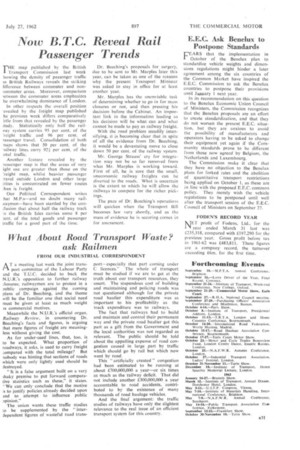What About Road Transport Waste? ask Railmen
Page 39

If you've noticed an error in this article please click here to report it so we can fix it.
FROM OUR INDUSTRIAL CORRESPONDENT
AA T a meeting last week the joint transport committee of the Labour Party and the T.U.C. decided to back the N.U.R.'s opposition to further railway :loSures; railwaymen are to protest in a aublic campaign against the coming plans of Dr. Beeching, and the theme will be the familiar one that social need must be given at least as much weight is commercial motives.
Meanwhile the N.U.R.'S official organ, Railway Review, in countering Dr. Beeching's facts and figures, is arguing that mere figures of freight are meaningless without giving the cost.
As for under-used lines, that, too, is to be expected. What proportion of roadways, it asks, is used to carry freight compared with the total mileage? But nobody was hinting that sections of roads which were only lightly used should be Jestroyed.
"It is a false argument built on a very -shaky premise to put forward comparative statistics such as these," it states. ' We can only conclude that the motive is to justify policies already decided upon and to attempt to influence public opinion."
The union wants these traffic studies Lo be supplemented by the " interJependent figures of wasteful road trans port—especially that part coming under C licences." The whole of transport must be studied if we are to get at the truth about our transport resources, they assert. The stupendous cost of building and maintaining and policing roads was not questioned although for the private road haulier this expenditure was as important to his profitability as the track expenditure was to railways.
The fact that railways had to build and maintain and control their permanent way and the private road haulier got this part as a gift from the Government and the local authorities was not regarded as relevant. The public should, be told about the appalling expense of road congestion caused in large ,part by traffic which should go by rail but which now went by road.
This "artificially created" congestion had been estimated to be running at about £700,000,000 a year—or six times as much as the railway deficit. That did not include another £300,000,000 a year accountable to road accidents, contributed to by the existence of many
thousands of road haulage vehicles. • And the final: argument: the traffic studies of railways have only the slightest relevance to the real issue of an efficient transport system for this country.
































































































































